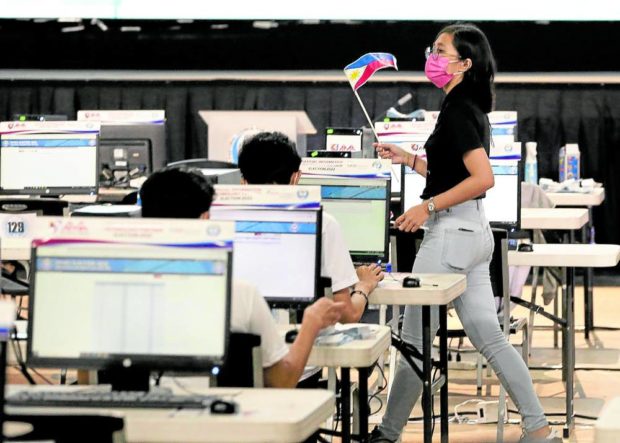
VOLUNTEER WORK | Volunteers encode election returns for manual auditing and validation at the Parish Pastoral Council for Responsible Voting Command Center set up at the University of Santo Tomas in Manila. (Photo by RICHARD A. REYES / Philippine Daily Inquirer)
MANILA, Philippines — The head of the Parish Pastoral Council for Responsible Voting (PPCRV) took to social media to defend the election watchdog’s role after questions about its mandate and her background started circulating online.
In a lengthy Facebook post on Sunday, PPCRV chair Myla Villanueva said that the random manual auditing of actual ballots was not part of their mandate but that of the National Citizens’ Movement for Free Elections (Namfrel) and the Legal Network for Truthful Elections (Lente).
Her post was in response to a letter circulating online from a certain Freddy Olbes, who identified himself as a PPCRV volunteer encoder. In a letter dated May 12, Olbes said he was “surprised and disappointed” upon finding out that he and the other volunteers were encoding precinct totals that had been added up from election returns, instead of the individual ballot receipts from different precincts selected randomly.
“The exercise that we, volunteers, were undertaking was akin to examining the veracity of an original document by perusing its carbon copy,” he said, adding: “In short, we were acting as the Comelec’s (and by inference the government’s) rubber stamp.”
Olbes went on to say that the PPCRV had “failed to live up to [its] mandate and had done the voters and country a disservice” by not demanding a recount of individual ballots.
Checking fraud
Villanueva, in her Facebook post, clarified that the PPCRV’s job was to check against transmission fraud when the election returns go into cyberspace and protect the votes against “dagdag-bawas” or vote-shaving.
In another briefing in March, she had explained the PCCRV’s mandate this way: “What we do [at] the command center is we match via encoding the results in the election return [with] that which the VCMs (vote-counting machines) transmitted electronically. Since our election returns are picked up before transmission, what we are trying to ensure is that no dagdag-bawas (vote-shaving) is happening.”
At a press briefing on Monday, PPCRV spokesperson and legal counsel Vann dela Cruz cited Republic Act No. 9369, which states that an accredited citizen’s arm would get only the fourth copy of the election returns.
“That is all that we have. We cannot get [copies] of the ballots because that is an election offense,” he added.
The fourth copy of election results is printed before VCMs transmit the data into cyberspace. Taken from all polling precincts nationwide, these are then forwarded to the PPCRV’s command center at the University of Santo Tomas (UST) campus in Manila for encoding by volunteers.
Questions
The data would then be compared to the post-transmission election returns posted on transparency servers.
This is not the first time that PPCRV has been hounded by disinformation spreading online.
At one time, netizens had questioned alleged discrepancies in the parallel count because of the “fixed gap” between front-runner presidential candidate Ferdinand Marcos Jr. and his main rival, Vice President Leni Robredo.
But Villanueva said in a briefing that the PPCRV did not find any anomalies, adding that it had tapped academic experts from different universities to further examine the watchdog’s tabulations.
Last week, the group also had to debunk a viral social media post about a supposed bomb threat and tear gas attack at its UST command center.
Other netizens, meanwhile, aired their doubts about the PPCRV’s credibility after they pointed out that Villanueva was the daughter of Mark Jimenez, a businessman and ally of former President Joseph Estrada.
Villanueva addressed this on her Facebook post by pointing out that she had been managing various technology companies for decades.
“I have run some of the most complex systems you can imagine for over 34 years,” she said.
“I have been blessed with my good reputation and success in the industry both here and abroad, and I wanted to give back,” she added.
Revalidation
As of 5 p.m. on Sunday, the PPCRV had received 62,752 ERs out of a total of 107,785. Of this number, 46,447 ERs had been encoded and matched while 355 ERs would have to undergo revalidation.
“As we encode more (election) returns, we expect more errors in encoding,” PPCRV trustee William Yu said in Monday’s briefing.
He explained that the mismatches were not unusual and a lot of the mistakes were due to clerical errors committed by encoders.
Namfrel had also volunteered to double-check the ERs it received to help in revalidating the 355 ERs, Yu said.
The PPCRV is a national parish-based political but nonpartisan lay movement founded in 1991 by the late Jaime Cardinal Sin, former Ambassador to the Holy See Henrietta de Villa, and the late former Commission on Elections Commissioner Haydee Yorac. It has been been an accredited poll watcher since the 1992 elections.
—WITH A REPORT FROM INQUIRER RESEARCH
RELATED STORIES
Instead of assailing automated polls, PPCRV says focus should be on vote buying, suppression
Doubts due to fast poll results transmission? PPCRV chair says it was faster in 2019
Scourge of social media falsehood hounds even PPCRV count